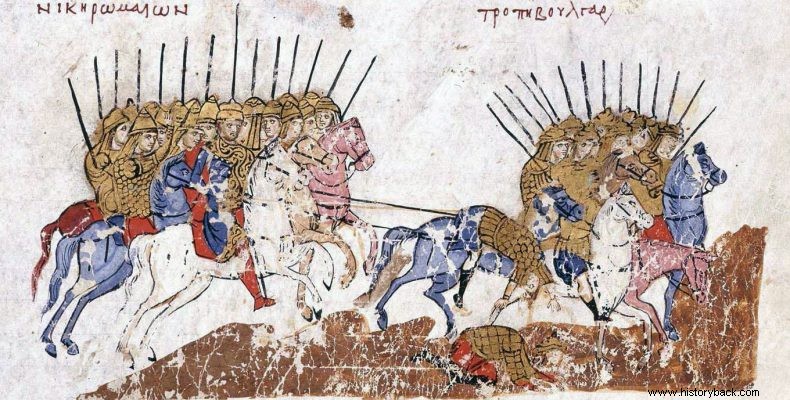
Samuel was the tsar of Bulgaria, founder of the first, so-called, Bulgarian empire and opponent of Vasilios II Bulgaroktonos. Samuel was a general of the Bulgarian Army, at the time of Tsar Romanos-Simeon I of Bulgaria.
Samuel and his three brothers were descendants of Count Nikolaos, a Bulgarian official in the service of Byzantium and for this reason they were called Komitopoulos – the sons the count. Their place of origin was Sofia, the current capital of Bulgaria.
The four Komitopoulos brothers rebelled against Byzantium and its supported king of Bulgaria, Romanos I. However, things were not favorable, initially, for them. Their attempt to ally the Vlachs of western Macedonia and Epirus proved disastrous, as the Vlachs repulsed them, killing their older brother David.
The second brother, Moses, was killed besieging Serres. Aaron was killed by his brother Samuel, because he wanted to make peace with Byzantium and he himself took over the reins of Bulgaria. The fate of Samuel is also known, as the great Byzantine emperor Basil II defeated him in the battle of Kleidi, in 1014 and finally occupied Bulgaria. Samuel died in 1018, never having recovered from the defeat at the Key.
An important element was the titling of Samuel's kingdom, by him, "Macedonian empire". The point of view of blessed Samuel was, of course, adopted by the "historians" of Skopje and those active within Greece in the neighboring state, even adding "Slavic" to the title of Samuel's state.
However, eminent Byzantine scholars, first of all the Russian (Slavic origin) Georgy Ostrogorski, or the also Russian Dmitri Obolenski, state that both Samuel and his state were purely Bulgarian and received the said title for reasons of prestige, in an attempt to compensate the brilliance of the Byzantine Empire, which was also his rival's awe.
But these are "fine print" for the lords of Skopje, but also for the lords of the political formation called "Rainbow". In their publication, in their magazine Nova Zora (new dawn), the masters of the Rainbow, projecting their unsupported theory, state that "Almost all of geographical Macedonia (except Solun/Thessalonica) was part of Samuel's state. The core of the state was Macedonia, specifically the regions of Ohrid and Prespa, where the island of Agios Achillios became its main political and ecclesiastical seat, after the establishment of an autocephalous church".
Of course, at this point they fail to mention that the islet was renamed Agios Achillios, when Samuel razed Larissa, slaughtering even the domestic animals and grabbed the holy relics of the saint from Larissa, transferring them to the said islet, precisely to establish his own, autocephalous church. They also forget to mention that the areas in question were the first to be liberated by the Byzantine Army and that Samuel's kingdom was limited to the current, approximate borders of Bulgaria.
On the other hand, Samuel had temporarily conquered lands in the areas of today's Albania, Serbia and Montenegro. So why isn't his "empire" Albanian or Serbian? In the Byzantine period, where the main connecting element of its inhabitants was, de facto, a multinational empire, there are clear references to all the ethnicities that coexisted within its borders.
There are also reports of tribal groups. Thus the Greeks, Armenians, Serbs, Bulgarians, as ethnic groups, or the Vlachs as a nomadic population group are clearly mentioned. Only one is not mentioned, the so-called "Macedonian", because it simply NEVER EXISTED.
Relatively recently, a fight broke out between Bulgarians and Skopians over the nationality of Samuel, whom the former, rightly, consider Bulgarian and the latter "Macedonian"...
